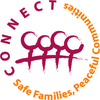15 Ways You Can Help Transform Intimate Partner Violence, Part 3

CONNECT cannot achieve a culture free from violence alone – we need your help. In the final part of this three-part series to honor of CONNECT’s 15th anniversary, we offer five ways you can help us prevent IPV for the next 15 years and onward!
1. Speak to children about healthy relationships and peaceful problem-solving. It’s critical to speak to children immediately when they see or hear something that’s potentially traumatic since they learn from us by absorbing everything they see and hear. When they understand the distinction between healthy and unhealthy behavior, they can make informed decisions. Those decisions can help them to avoid manifesting internal conflict into self-destructive habits, as well as violence.
2. Never use or condone degrading or dehumanizing language. Any language that makes someone feel inferior; objectifies or sexualizes them; takes away their agency; or makes them feel unsafe is harmful. Both direct and indirect language of that nature is harmful. When we use words, such as the “B” word or the “N” word, they send messages that are shaming or threatening, and often incite fear and rage. When we hear these words being used but say nothing, it sends a message that we condone and even validate the verbal abuse. Mutual respect begins with how we treat other. That begins by acknowledging that words matter.
3. Be prepared. Help survivors create safety plans. Help survivors memorize local and national DV hotline numbers. NYC’s 24-hour hotline is 1800 621 HOPE (4673), and the national hotline is 1800 799 SAFE (7233). For their safety, it is best to memorize these numbers so they are readily available during an emergency where time is a key factor in a decision that could mean danger or safety. Help educate survivors about their various options (orders of protection, police intervention, shelters, etc.) Each situation is unique and therefore there is not a uniform approach to assisting survivors and safety planning. It is important to note that survivors know their situations best and therefore are best equipped to make decisions regarding their safety plans.
4. Be informed. Attend trainings and workshops. Stay up-to-date on developments regarding IPV policies. Share, follow, and like our updates and posts. Help spread the word about the work we are doing and how others can help us prevent IPV. Follow our blog [Insert link], follow us on Instagram/twitter, sign up for our newsletter, and like our Facebook page. You can also find us on LinkedIn.
5. Be positive. The good news is that IPV is preventable. According to the Center for Disease Control, domestic violence is “a public health epidemic that can be prevented.” Due to our work over the last 15 years, CONNECT knows this to be true. We believe it is possible to do so by transforming the attitudes, beliefs and behaviors that fuel violence. We have consistently seen it done. We believe that peaceful and respectful relationships are achievable when we are committed to living nonviolently. We believe in being the change — and peace — we want to see in the world…and we believe that YOU can help us work toward a world without IPV for the next 15 years and onward!
To support CONNECT in the work we do, consider donating. Every contribution helps.
Let’s stay CONNECTed! Join our community, spread the word by sharing this post, donate today and/or lead a fundraiser for CONNECT!
